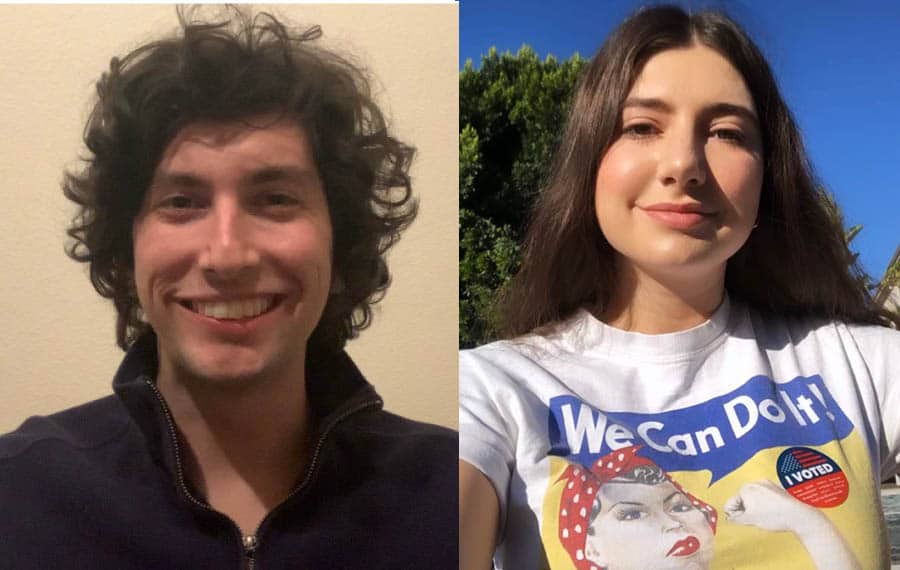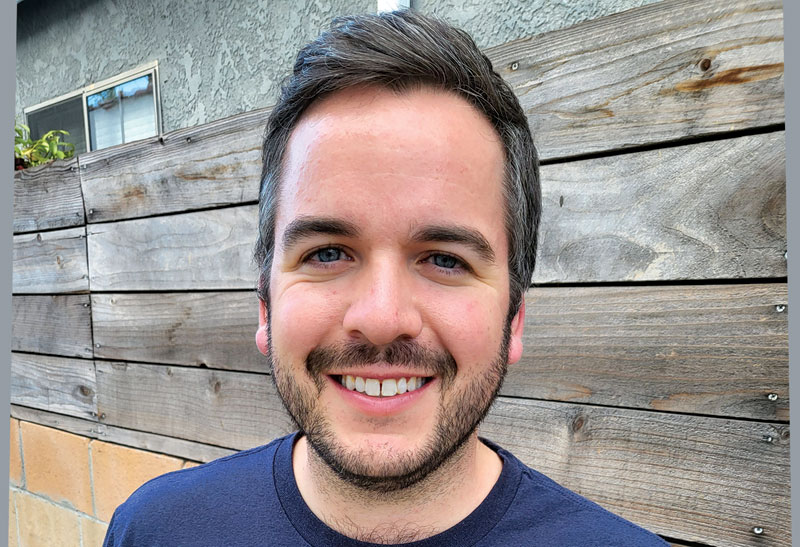
Among the local delegates at last week’s Democratic National Convention to officially nominate Joe Biden and Kamala Harris as the party’s 2020 presidential ticket were two young Jewish delegates: Abby Kingsley, a Duke University student studying labor law, and Nick Gaines, who works in the office of state Sen. Henry Stern (D-Canoga Park). They spoke separately with the Journal about the highlights and disappointments of their virtual DNC experience.
“The primary responsibility is to vote for the candidate and represent the candidate that you pledged to vote for during the roll call, and then also to vote to confirm or deny the party platform,” said Kingsley, a registered delegate for Sen. Elizabeth Warren (D-Mass.).
Each state receives a certain number of pledged delegates, selected at the state/local level with the understanding they will support a particular candidate. If their candidate drops out, the delegate is free to vote for another candidate. Candidates must win a majority of combined delegate votes at the DNC to secure the nomination. Kingsley voted for Biden to honor her pledge of support to Warren, “because Elizabeth Warren has been such a forceful advocate for him.”
Gaines was a delegate for Sen. Bernie Sanders (I-Vt.) but plans to vote for Biden in November. “We still need a mass movement that is going to advocate for a progressive vision for this country and, not but, we need to elect Joe Biden as the next president of the United States and Kamala Harris as the next vice president,” Gaines said.
A primary responsibility for delegates is to be among the Democratic Party’s most engaged representatives, said Kingsley, also a fellow for the Jewish Democratic Council of America, doing volunteer recruitment in key swing states.
“The convention itself has been a little bit of a letdown,” Gaines said, acknowledging the difficulty of the party’s task to “fundamentally redesign” the convention due to the coronavirus pandemic. He said he wished there had been a “Zoom-in” for the roll call so delegates could hold up signs as was traditional at past conventions.
Opportunities to network or submit recommendations to various task forces involved in shaping the party platform were “very, very much lost in a virtual convention,” Kingsley said. Many webinar meetings with key constituencies disabled chat to avoid online trolls, thereby closing off opportunities for delegates to interact.
Kingsley was born in Tarzana, grew up in Encino and attended Valley Beth Shalom and Stephen S. Wise for Hebrew school. She attended the Aug. 18 DNC Jewish Community Meeting webinar, featuring prominent Jewish political figures addressing Jewish community issues. Kingsley found Sanders’ absence “disappointing … considering he is arguably the most famous Jewish political figure of our time.”
“I think both [Joe Biden and Kamala Harris] have a renewed commitment to criminal justice issues and have shown that they are open to critique. I hope that they listen to the will of the Democrats.” — Abby Kingsley
“[Sanders] never really made it a big part of his campaign,” Gaines said. “But as a Jewish person, I found it really exciting to see the values of our community — that universal sense of compassion and justice, that we have to fight for everyone not just ourselves — that kind of tradition of Jewish socialism and Jewish compassion on the national stage. I wish it had been more a part of the campaign.”
Kingsley, who has done extensive research about income inequality and its role as an issue in the 2020 primary, was encouraged by the DNC’s emphasis on labor issues “as a core tenet of Democratic values. I’m really proud that the party is moving away from the more corporate- and business-emphasized party of Bill Clinton and back toward the labor-focused party of FDR,” she said, referring to President Franklin Delano Roosevelt.
Kingsley is looking forward to “the first Jewish second spouse,” Doug Emhoff, who is married to Harris, and acknowledged the historic nature of Harris’ nomination, but she remains critical of the nominees’ criminal justice policies.
“I think both have a renewed commitment to criminal justice issues and have shown that they are open to critique. I hope that they listen to the will of the Democrats,” she said.
Kingsley and Gaines are both involved in the newly founded Young Delegates Coalition (YDC), a space for delegates under 35 across the ideological spectrum. In a foreign policy platform discussion through the group, Kingsley had a conversation about the Israel-Palestinian conflict that was “one of the most respectful that I’ve ever been a part of.” Kingsley explained how anti-Zionism and anti-Semitism are often conflated and how people hide anti-Semitic beliefs behind anti-Zionism. People were respectful and grateful for her input, she said, sending her comments like “we will strive to do better” and “we have a lot to learn from each other.”
Kingsley considers herself “both pro-Israel and pro-Palestinian,” and believes that sovereignty, self-determination and prosperity can be achieved for “both groups, who I think have very important ties to the land. It’s definitely a hard conversation, but I’m not someone who shies away from hard conversations,” she said.
Other Democratic spaces Kingsley has been a part of have had strong Jewish representation, but with the YDC, she “sometimes felt like the lone voice identifying issues of anti-Semitism.” She sought out other Jewish members of the coalition but very few have self-identified as Jewish.
When the YDC was considering Rep. Ilhan Omar (D-Minn.) as a young DNC speaker, Kingsley objected, noting Omar’s use of anti-Semitic tropes to advance her support for the boycott, divestment and sanctions (BDS) movement and the Palestinian cause. One YDC member said Kingsley was “pushing forth a right-wing conspiracy.” Kingsley replied with examples of Omar “saying Israel is hypnotizing the world” and Omar responding to the American Israel Public Affairs Committee (AIPAC) by saying, “It’s all about the Benjamins.”
“I don’t think it’s bad to uplift Palestinian voices and advocate for Palestinian rights, but never by using anti-Semitic tropes,” Kingsley said. “I think she wants to genuinely uplift all groups but does have a blind spot for her Jewish constituents.”
Gaines said he completely supports Israel but not in the same way as older members of the Jewish community who advocate for Israeli security because they are “worried that the existence of Israel is under threat. Israel will continue to exist.” he said. “But the thing that is in question is what’s going to happen to the Palestinians. When young Jews on the left speak in favor of the Palestinians, we do so fully supporting the rights of Israelis and Israeli Jews to live in peace and security, as well. We are just trying to lift other people up. We are not trying to push anybody down.”
Gaines said he is looking to April 30, 2021, the 100-day mark in a potential Biden presidency, at which point, he said, “Joe Biden and Kamala Harris can either choose to recognize the historic moment we are in and govern accordingly, or there will be a lot of people like me who will demand extreme accountability of the party that we are putting in power at the expense of our own immediate kind of values.”






















 More news and opinions than at a Shabbat dinner, right in your inbox.
More news and opinions than at a Shabbat dinner, right in your inbox.